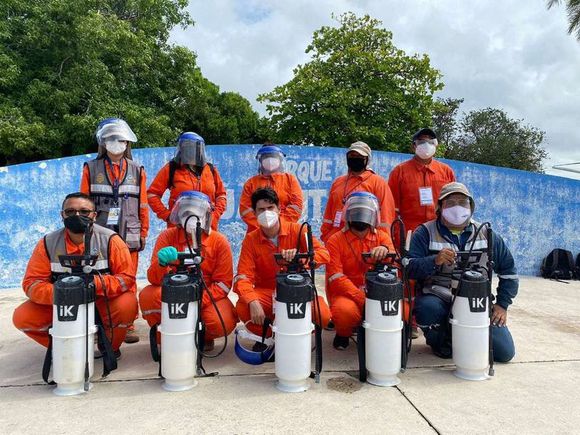Mérida, Yucatán, (June 10, 2021).-” More than 15 thousand homes in Yucatán will receive an insecticide spray to control the Aedes aegypti mosquito, which transmits dengue, chikungunya, and Zika diseases,” reported the research professor of the Campus of Biological and Agricultural Sciences of the Autonomous University of Yucatán (UADY), Pablo Manrique Saide.
The specialist pointed out that from May to June, brigades of the Entomological Bioassays Unit of the UADY (UCBE-UADY) and personnel of the Yucatan Health Secretariat (SSY), carry out the application of insecticide in the places where mosquitoes rest as low walls, under furniture, and on dark surfaces.
Residual spray
He explained that this is part of the project they carry out in collaboration with Emory University, in which a Targeted Indoor Residual Spraying (TIRS) is used to control mosquitoes.
“This project consists of six stages, we are in stage five, which consists of applying the insecticide for 15 minutes and the house will be protected for six months , therefore, with only one application per year before the rainy season, the presence of the mosquito inside the houses is controlled ”, he pointed out. Brigades from the Entomological Bioassays Unit of UADY and SSY personnel carry out the application of insecticide.

In this sense, the researcher stressed that the product used is recommended by the Ministry of Health, and safe for people, their pets, and plants.
The last stage will consist of the “Intervention evaluation through active epidemiological surveillance”, which will be carried out through home visits, telephone calls, monthly entomological and annual serological surveys for three years, to control and quantify the impact of the disease.
Among the Merida neighborhoods that participate in this study are Castilla Cámara, María Luisa, Libertad, El Roble, Melchor Ocampo, García Ginerés and El Porvenir, among others.
How to avoid breeding sites?
Manrique Saide provided some of the recommendations to prevent mosquito breeding: install mosquito nets, take care that the containers that are in the backyard of the houses do not fill with water, wear long sleeves and pants in areas where flies predominate, as well as remove objects that can serve as hatcheries.
The results of this study supported by the National Institutes of Health (NIH), will provide epidemiological evidence of the efficacy of TIRS in reducing the disease and infection of diseases such as dengue, chikungunya and Zika.
Source: Sipse



